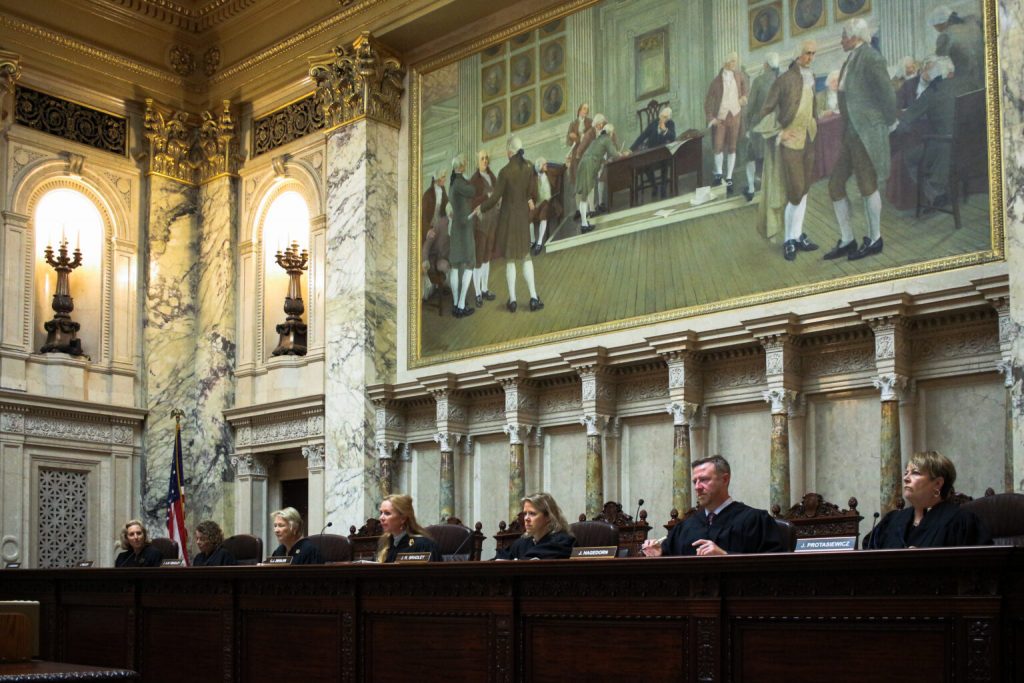Supreme Court Bickers Over Consultant Costs For Redistricting
'What a mess... today’s order is a brazen imposition of judicial will.'

The seven members of the Wisconsin Supreme Court hear oral arguments. (Henry Redman | Wisconsin Examiner)
The Wisconsin Supreme Court on Monday ordered the six groups that submitted maps in the lawsuit against the state’s old gerrymandered political maps to split the $128,000 owed to two consultants hired by the Court to assess proposed maps.
The Court ultimately didn’t need to decide which maps should be chosen after Gov. Tony Evers and the Republican-held Legislature reached a deal on implementing new maps proposed by Evers in February. The two consultants did author a report assessing the proposed maps submitted by each of the groups involved in the case.
Under the Court’s Monday order, each group must pay $21,359.67.
The decision — like many of the Court’s actions since Justice Janet Protasiewicz took her seat last August, swaying ideological control of the Court to the body’s four liberals — included accusations of partisanship.
In a dissent, joined by Justice Rebecca Bradley, Chief Justice Annette Ziegler referred to the Court’s majority as a “court of four” as she accused the liberals of improperly communicating with the two consultants and making decisions without transparency.
“Trust us! We’re from the government, and we’re here to collect our $128,158 bill,’” Ziegler wrote. “But trust cannot be demanded where transparency is glaringly absent. From the outset, this case has been rife with procedural irregularities, legal contortions, and due process problems. Now, parties are ordered to pay the non-itemized bill submitted by the ‘consultants’ for services which the court of four contracted through the Director of State Courts.”
In another dissent, Justice Brian Hagedorn wrote that the decision to split the bill is a “brazen imposition of judicial will” and that the hiring of the consultants was improper.
“What a mess. To no one’s surprise, this case is moving toward closure with new legislative maps that align with four justices’ sense of political fairness,” he wrote. “The only question was how — not if — we would get here. And now we’re left with a $128,000 bill that needs to be paid. Following the theme of this entire case, today’s order is a brazen imposition of judicial will, not a principled application of the law.”
But Justice Rebecca Dallet objected to the accusations that the Court’s majority acted improperly, writing that the redistricting case followed an agreed upon process in which the consultants completed a job that none of the parties in the case could have done themselves.
“In every case, we — a court of seven — evaluate the parties’ submissions and arguments in good faith and render decisions that reckon with the arguments of the parties,” Dallet wrote. “At times we disagree, sometimes vehemently. But we remain a seven-member court even when we disagree. The majority vote rules, and the dissenting justices are welcome to voice their disagreement in separate writings.”
Dallet added that the consultants did their work well and did it under budget.
“In the end, it was not necessary for this court to adopt new maps in this case,” she continued. “That was because the political process worked: The legislature enacted new state legislative district maps and the governor signed them into law. Nevertheless, I commend the Consultants for their work in this case.”
Wisconsin Supreme Court splits cost of consultants in redistricting case was originally published by Wisconsin Examiner.





















